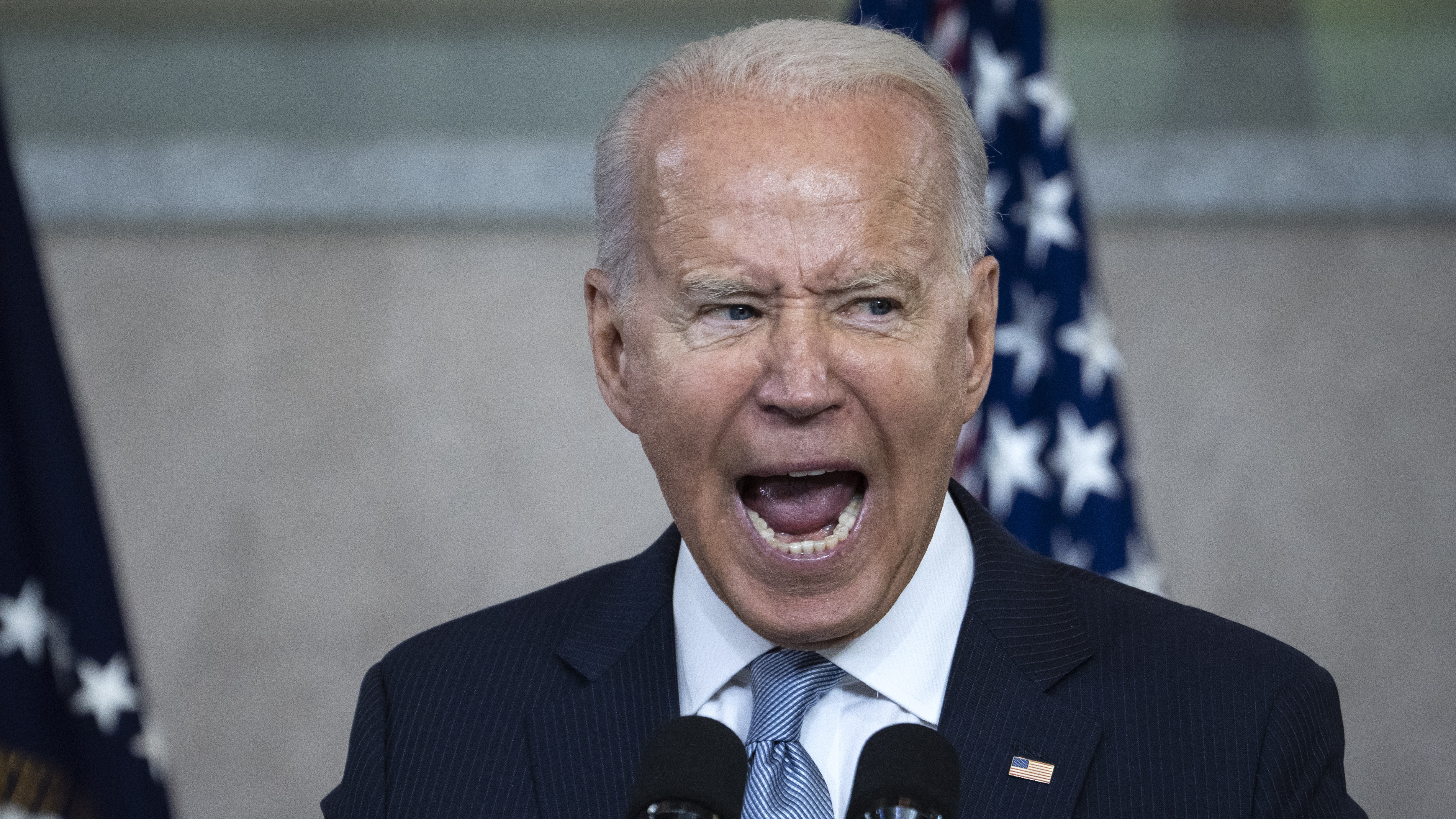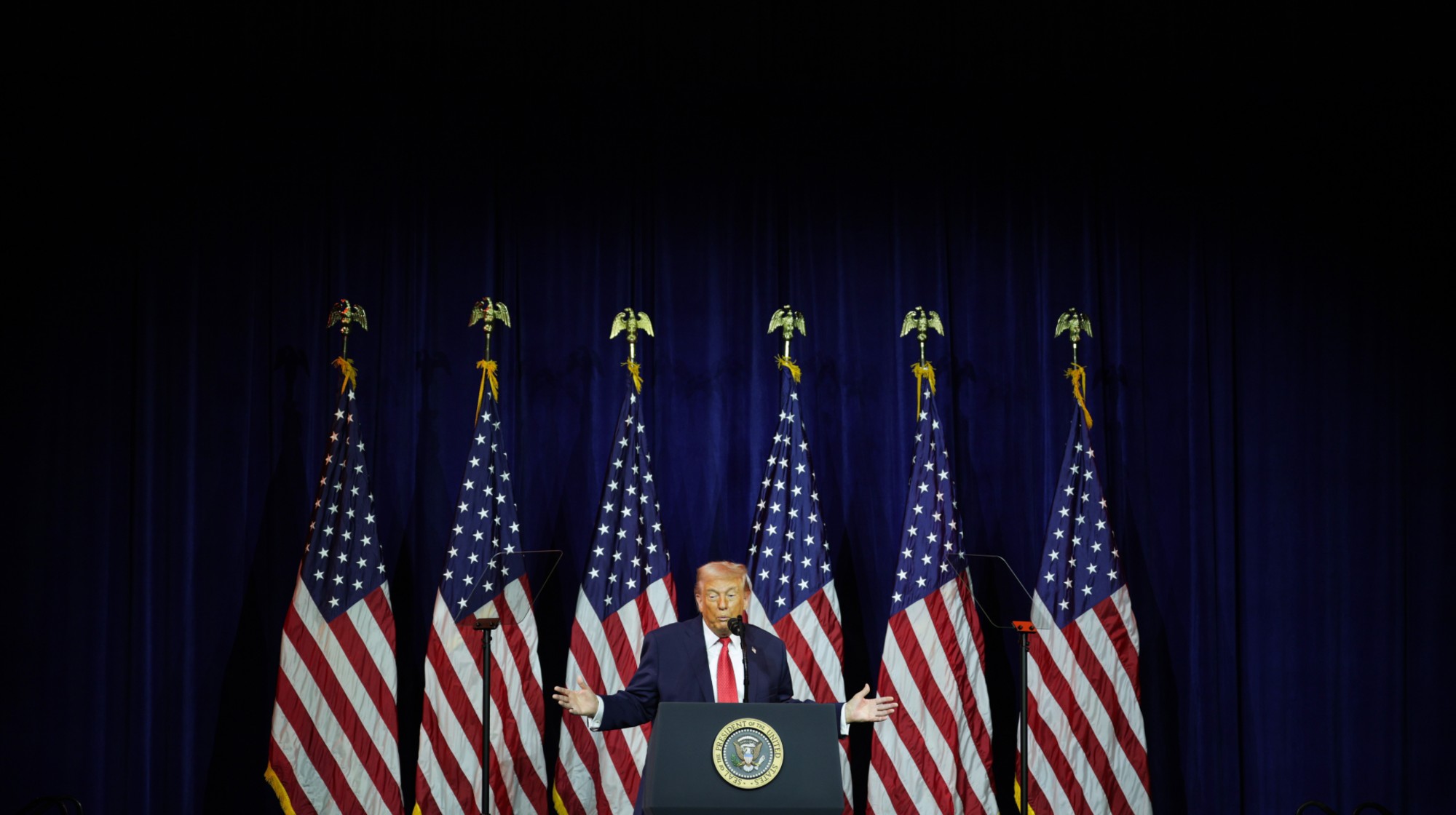Why Joe Biden is battling Republicans over US voting rights
US president seeking to reinvigorate national election legislation - but fails to mention all-important filibuster

A free daily email with the biggest news stories of the day – and the best features from TheWeek.com
You are now subscribed
Your newsletter sign-up was successful
Joe Biden has accused Republicans of trying to pull off the greatest curbs on US voting rights since the Civil War as he launches a pushback against restrictive state election laws.
During a speech on Tuesday in Philadelphia - where the Declaration of Independence and the US Constitution were signed - the president said the Republicans behind the state laws were “undemocratic”, “unpatriotic” and “un-American”. The “voter suppression” laws were being motivated by Donald Trump’s “big lie” that the 2020 election was rigged, he added.
“In America if you lose you accept the results, you follow the Constitution,” Biden told an audience at the National Constitution Center. “You don’t call facts fake and then try and bring down the American experiment just because you’re unhappy.
The Week
Escape your echo chamber. Get the facts behind the news, plus analysis from multiple perspectives.

Sign up for The Week's Free Newsletters
From our morning news briefing to a weekly Good News Newsletter, get the best of The Week delivered directly to your inbox.
From our morning news briefing to a weekly Good News Newsletter, get the best of The Week delivered directly to your inbox.
“That’s not statesmanship, that’s selfishness. That’s not democracy, that’s the denial of the right to vote.”
Debate over US voting rights has been intensified by a row about the Texas Legislature, which is “engulfed in chaos over a Republican effort to change election rules”, The New York Times (NYT) reports. The Democrats “have no evident way to stop the Republican-backed laws”, the paper says, but some members of the ruling party “hope that presidential attention will persuade Congress to pass a voting-rights bill” outlawing the new legislation.
Texan revolt
Republicans in 17 US states have already passed reforms to limit postal and early voting in the wake of Trump’s unsubstantiated claims that the presidential election was “rigged” against him.
A free daily email with the biggest news stories of the day – and the best features from TheWeek.com
And according to the Brennan Center for Justice, a nonprofit law and public policy institute based at the New York University Law School, Texas may soon become the 18th.
Republicans have “justified these new laws by saying that they want to crack down on voter fraud”, the NYT reports. All 17 states “enacted laws that give partisan officials more control over election oversight”, the paper says, “potentially allowing those politicians to overturn an election result”, as Trump “urged state-level Republicans to do last year”.
The Texas legislation would “bring in new identification requirements for postal voting”, as well as banning “election officials from sending a postal vote application to someone who has not requested one”, The Times reports.
Further afield, the Republican-controlled state of Georgia has passed legislation giving lawmakers the power to remove local election officials. And Arkansas has given a state board the power to “take over and conduct elections” in a county if the GOP-majority legislature considers the move to be necessary.
Earlier this week, around 50 Texas Democrats travelled to Washington D.C. in an effort to prevent a two-thirds quorum required to pass a voting bill in its state house being reached. The Texas House responded by issuing arrest warrants for the absent Democrat lawmakers.
The Texas Democrats used the trip to “plead with Congress to pass new federal voting laws”, The Washington Post reports. Vice- president Kamala Harris told lawmakers: “I know what you have done comes with great sacrifice, both personal and political. Defending the right of the American people to vote is as American as apple pie.”
As the NYT notes, “it’s not hard to imagine how Republican legislators could use some of these new rules to disqualify enough ballots to flip the result of a very close election”. The paper cites the examples of Arizona and Georgia - both key swing states in Biden’s successful bid for the White House.
However, passing nationally binding legislation to put an end to the Republican states’ new voter laws is a tough challenge for the president.
‘21st century Jim Crow assault’
Democrat lawmakers arei ncreasingly afraid that “the crackdown on postal and early voting will hit their support in next year’s mid-term elections”, The Times reports. Historically, when US elections have had lower turnouts, Republicans have won.
During his speech in Philadelphia this week, Biden described the legislation as a “21st century Jim Crow assault” - referencing the state and local laws that enforced racial segregation in the US until the mid-1960s. This assault “is real, it’s unrelenting and we’re going to challenge it vigorously”, he said.
“While this broad assault against voting rights is not unprecedented, it is taking on new and pernicious forms”, the president continued. “We’re facing the most significant test of our democracy since the Civil War. I’m not saying this to alarm you, I’m saying this because you should be alarmed.”
Biden’s speech was an “attempt to inject new life into flagging efforts to pass federal legislation addressing the issue”, says The Washington Post.
Amid growing pressure on Biden from within his party to push through a federal law in Congress that would ban the state voter laws, his intervention will at least help “avoid criticism from progressive Democrats that he is ignoring the subject”, the NYT adds. But while the US leader does “appear to be genuinely concerned about the issue”, says the paper, “the use of the presidential bully pulpit is one of the few options available to him”.
Biden’s “legislative and legal options are limited”, agrees The Times. His attorney general, Merrick Garland, has launched a legal challenge against Georgia on the grounds that its new law enacts “restrictions with the purpose of denying the right to vote on account of race or colour”.
But the Democrats’ main solution to the problem is the For the People Act, which would legally mandate same-day registration, two weeks of early voting, expand postal voting and make election day a holiday. However, the act is being opposed by one Democrat senator - Joe Manchin of West Virginia - and has no GOP support in the Senate.
This lack of support in the upper house has seen Biden draw fire for something that he did not say during his Philadelphia speech - that he would take on the filibuster procedure in an effort to open a pathway to passing national voting protections.
“A call for the Senate to change the filibuster is seen by advocates as the best, and perhaps only, way to usher in the kinds of changes Biden is seeking,” says The Washington Post. Currently, the procedure facilitates senators slowing down or blocking bills and resolutions from getting a vote.
Progressives in Biden’s party have said the filibuster “should be scrapped or altered in order to pass voting rights legislation”, The Hill reports. Alternately, Democrat House of Representatives Majority Whip James Clyburn has “suggested that an exception to the Senate filibuster be made to allow bills related to voting rights to bypass the procedural rule by simple majority”, the news site adds.
All the same, the filibuster - sometimes referred to as the “Soul of the Senate” by advocates - is fiercely defended by Republicans and some Democrats.
And the president - at least publicly - still remains “reluctant to press for the changes to the filibuster that would be needed” to push through the For the People Act, The Washington Post adds.
-
 Nordic combined: the Winter Olympics sport that bars women
Nordic combined: the Winter Olympics sport that bars womenIn The Spotlight Female athletes excluded from participation in demanding double-discipline events at Milano-Cortina
-
 Samurai: a ‘blockbuster’ display of Japanese heritage
Samurai: a ‘blockbuster’ display of Japanese heritageThe Week Recommends British Museum show offers a ‘scintillating journey’ through ‘a world of gore, power and artistic beauty’
-
 BMW iX3: a ‘revolution’ for the German car brand
BMW iX3: a ‘revolution’ for the German car brandThe Week Recommends The electric SUV promises a ‘great balance between ride comfort and driving fun’
-
 El Paso airspace closure tied to FAA-Pentagon standoff
El Paso airspace closure tied to FAA-Pentagon standoffSpeed Read The closure in the Texas border city stemmed from disagreements between the Federal Aviation Administration and Pentagon officials over drone-related tests
-
 How corrupt is the UK?
How corrupt is the UK?The Explainer Decline in standards ‘risks becoming a defining feature of our political culture’ as Britain falls to lowest ever score on global index
-
 Democrats win House race, flip Texas Senate seat
Democrats win House race, flip Texas Senate seatSpeed Read Christian Menefee won the special election for an open House seat in the Houston area
-
 The ‘mad king’: has Trump finally lost it?
The ‘mad king’: has Trump finally lost it?Talking Point Rambling speeches, wind turbine obsession, and an ‘unhinged’ letter to Norway’s prime minister have caused concern whether the rest of his term is ‘sustainable’
-
 The high street: Britain’s next political battleground?
The high street: Britain’s next political battleground?In the Spotlight Mass closure of shops and influx of organised crime are fuelling voter anger, and offer an opening for Reform UK
-
 Trump fears impeachment if GOP loses midterms
Trump fears impeachment if GOP loses midtermsSpeed Read ‘You got to win the midterms,’ the president said
-
 Senate votes down ACA subsidies, GOP alternative
Senate votes down ACA subsidies, GOP alternativeSpeed Read The Senate rejected the extension of Affordable Care Act tax credits, guaranteeing a steep rise in health care costs for millions of Americans
-
 Can Mike Johnson keep his job?
Can Mike Johnson keep his job?Today's Big Question GOP women come after the House leader